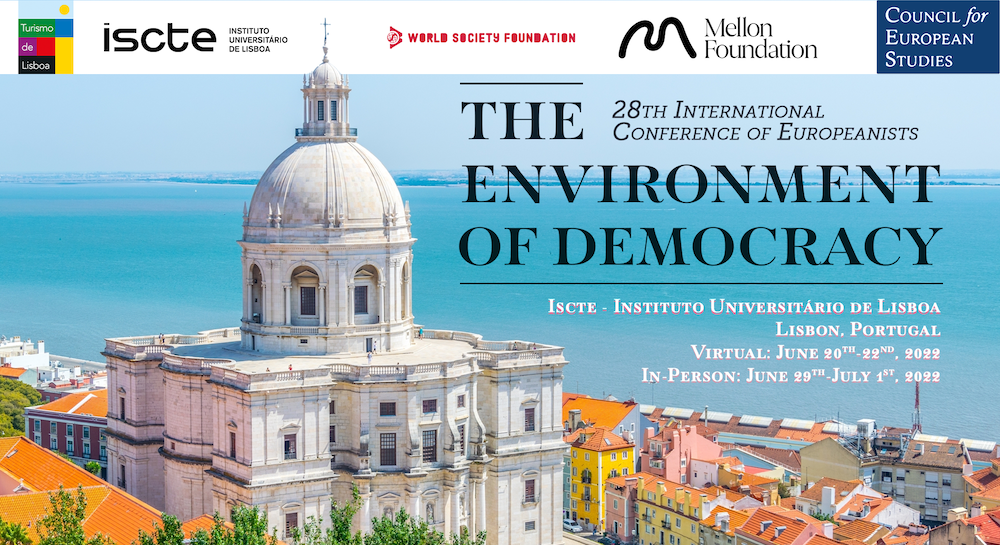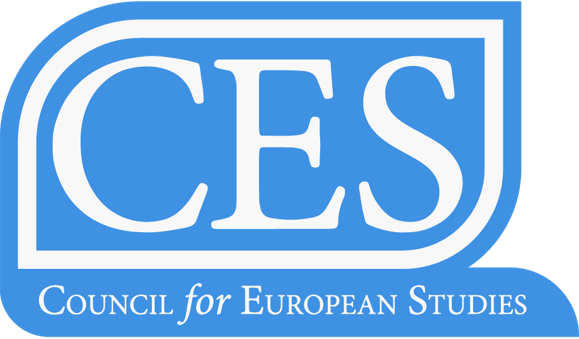
Twenty-Eighth International Conference of Europeanists
ISCTE-IUL – Instituto Universitário de Lisboa
Building II, Av. das Forças Armadas, 1649-026, Lisboa, Portugal
Click here for the Conference Program Highlights
Click here for the Final Conference Programs
June 20-22, 2022 – Virtual Sessions
June 29-July 1, 2022 – In-person Sessions
Quality of environment and quality of democracy are increasingly interconnected in ways that are shaping social, political, and economic life at local, national, and global levels. An example of this interconnection is the frequent association of populism with climate change denial or refusal of climate policies. Or the call by social movements, environmental organizations, and activists for more innovative, deliberative, and participatory practices in policy-making as a way to transform our capacity to tackle climate change and other environmental challenges democratically. Today, many such movements and groups are at the forefront of demand not just for new public policies but also for the elaboration of new forms of democratic participation. On the side of academic research, different social and human sciences (such as political science and public policy, sociology, psychology, geography, economy, anthropology, history, and cultural studies, among others) have been increasingly dealing with environmental issues, including their democratic implications. In this context, dialogue between social and human sciences with natural sciences has also strengthened. Nonetheless, technological innovation, which has frequently moved much faster than innovation in policy-making and regulation, has proven another challenge affecting both the environment and democracy. This tension is evident, for example, in urban life, as cities increasingly concentrate and consume resources while simultaneously being increasingly characterized by inequality in energy, the use of space, and air quality. These inequalities affect vulnerable groups like women and migrants most strongly, thereby adding new dimensions to existing intersectionality. The growth of travel and tourism in recent decades and the continuing depletion of biodiversity enhanced by technological capacities are just a couple of examples of the same tension. If the ongoing pandemic has suspended or superseded this trend for a while, it is still uncertain which new and different models will be implemented in the future. Moreover, preliminary analyses show that inequalities have grown in the pandemic context at various levels (political, social, economic, educational, environmental, and housing).
Against this background, the current situation provides an opportunity to discuss possible alternative and innovative patterns for our future critically. The aim of the 2022 Lisbon conference will thus be to join scholars from different areas to reflect on and discuss the relation between environment and democracy from a multidisciplinary and multilevel perspective. While all proposals related to Europe will be considered, we especially welcome submissions specifically dealing with environmental issues, problems of democracy, and the relation between democracy and the environment.
Meet the Conference Program Committee Chairs

Paula Castro, Co-Chair is Full Professor of Psychology at ISCTE-IUL and a researcher at CIS-IUL. Her research focuses on the responses of publics and communities to new policies and legislations, especially new environmental policies and laws, looking also at how these are presented to public spheres by the media and experts/policy makers. She has published widely in high impact journals relevant for social, environmental, community and political psychology, and for public policy. She is currently Director of CIS-iscte.

Alison Johnston, Co-Chair is an Associate Professor and the Ulysses G Dubach Chair in political science at Oregon State University. She is a political economist whose research covers European monetary integration and politics of labor markets and capitalist institutions. She is a co-editor of the Review of International Political Economy and a co-chair of the European Integration and Global Political Economy research network at CES.

Gökce Yurdakul, Co-Chair is a Sociology Professor at the Department of Social Sciences at Humboldt Universität zu Berlin. She is the Head of the department on “Basic Scientific Questions” at the Berlin Institute for Empirical Integration and Migration Research (BIM). Her research and teaching focus on comparison of immigration and citizenship regimes (Western Europe and North America), theory of racism, ethnic and religious forms of belonging in immigration countries, gender studies and intersectionality studies. In her research she mainly investigates how migratory experiences shape gender and racialized identities in the European context.

Guya Accornero, LOC Chair is an Assistant Professor in Political Science at the Iscte-Instituto Universitário de Lisboa (Iscte-IUL), co-chair of the Research Group on ‘Politics and Citizenship’ and deputy director of the ‘Observatory for Democracy and Political Representation’, both at the Center for Research and Studies in Sociology (CIES-Iscte). She is the Principal Investigator of the FCT funded Project ‘HOPES: HOusing PErspectives and Struggles’, and co-chair of the CES Research Network Social Movements. Her main area of teaching and research are social movements, digital activism, policing protest, radicalism, gentrification, housing activism, citizenship.
CES Chair:
Karen Anderson, University College Dublin




